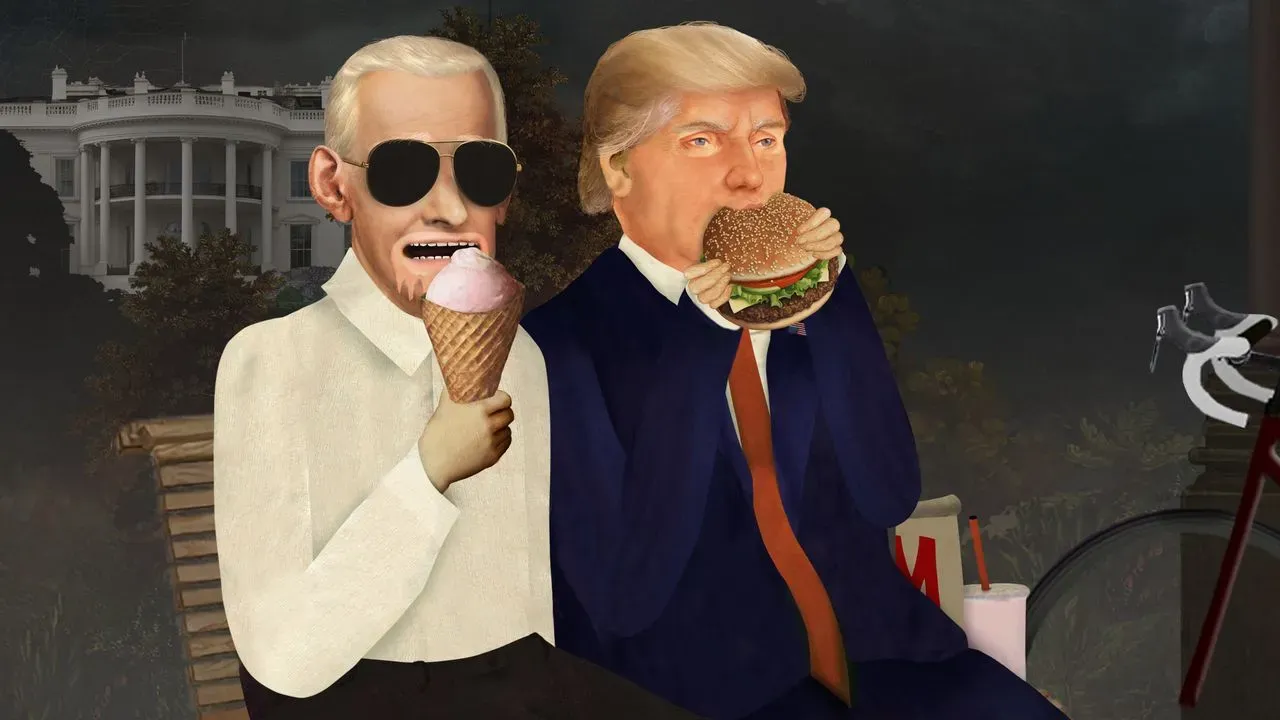The memeification of politics has transformed the way we engage with current events and ideologies, pushing political discourse into the realm of humor and virality. Platforms like Jubilee Media have capitalized on this trend, creating viral debate shows that dissect contentious social issues with a comedic twist. In the latest episode featuring progressive Mehdi Hasan against a group of far-right conservatives, viewers witnessed how political memes can disrupt traditional debate formats and fuel online discussions. As clips from these episodes circulate on social media, they often become the basis for political memes, shaping public perception and engagement. By examining how such formats influence opinions and narrative styles, we can better understand the evolving landscape of political engagement through these modern, meme-driven lenses.
The transformation of political dialogue through humorous content and digital interactions has redefined modern engagement strategies. This phenomenon, often labeled as ‘political humorization,’ manifests in various forms, particularly through online debates that provide a platform for contrasting viewpoints. Shows like Jubilee Media’s Surrounded illustrate how diverse arguments, especially those from self-identified far-right conservatives, can be showcased in a memorable and shareable format. Renowned figures such as Mehdi Hasan navigate these online clash arenas, drawing attention through engaging exchanges that resonate with audiences. By analyzing these trends, we can uncover the dynamics that allow political narratives to spread and evolve in the digital age.
Understanding the Memeification of Politics
The memeification of politics has transformed the way we engage with political discourse. In an era dominated by social media, political memes have become a powerful tool for communication, shaping public opinion and influencing debates. They condense complex ideas into easily digestible formats that resonate with audiences, often using humor and satire to comment on current events. This trend can particularly be observed in shows like Jubilee Media’s ‘Surrounded’, where the juxtaposition of extreme political views leads to content that is not only entertaining but also shareable across various platforms.
By distilling arguments into meme-worthy snippets, broadcasters like Jubilee Media capitalize on the virality of online content. This phenomenon encourages viewers to form quick opinions based on short-form media rather than in-depth analysis, creating an environment where nuance is lost. As seen in the recent debate featuring Mehdi Hasan and far-right conservatives, the resulting clips often circulate widely, with participants trading on their perceptions of victory, regardless of the actual merits of their arguments. Thus, the memeification of politics plays a crucial role in shaping narratives and mobilizing support for various political ideologies.
The Role of Political Memes in Online Debates
Political memes have emerged as pivotal elements in online debates, encapsulating ideological conflicts in visual formats. Memes serve as instantaneous commentary, reflecting the sentiments of specific political groups while also mocking opposing views. This rapid-fire exchange of ideas, as seen in Jubilee’s ‘Surrounded’, allows for the amplification of voices—both reasonable and extreme. The interplay of humor and serious political discourse can make the seemingly intractable issues accessible to a broader audience. For instance, during Mehdi Hasan’s engaging yet startling debates with far-right conservatives, snippets of extreme views quickly became viral memes, overshadowing the deeper conversations that may have taken place.
As participants utilize political memes to garner support, they can also distort narratives surrounding controversial discussions. Memes simplify complex arguments into funny or relatable visuals, which can misinform or bias audiences against nuanced perspectives. In the case of controversial debaters like Hasan, who confronts opposing ideologies, the resulting memes often highlight the sensational rather than the substantive. Therefore, while these political memes can stimulate engagement and dialogue, they can also lead to a misunderstanding of the core issues at hand, making it essential for viewers to seek deeper understanding beyond the memes.
Jubilee Media’s Impact on Political Discourse
Jubilee Media has carved a niche in the realm of political discourse, transforming typical debate formats into viral sensations. By featuring high-profile debaters like Mehdi Hasan opposing many, they not only draw significant viewership but also spark extensive online discussions. The combination of diverse political opinions and the pressure of public scrutiny helps to highlight the most extreme viewpoints, creating a spectacle that often garners more attention than the actual arguments presented. This trend encourages participants to seek out the most sensational and divisive sound bites, which can be further transformed into memes, amplifying their reach.
However, critiques abound regarding Jubilee Media’s approach to political debates, particularly surrounding their choice of participants and the nature of the discussions they foster. Critics argue that this format prioritizes entertainment over meaningful discourse, potentially leading viewers to a shallow understanding of complex political issues. For example, Hasan’s encounter with self-identified far-right conservatives was not just a clash of opinions but turned into a viral meme-factory that perpetuated a cycle of sensationalism. As such, while Jubilee Media undeniably influences political conversations today, it also raises important questions about the responsibilities of media creators in shaping informed public perceptions.
The Challenges of Hosting Debates with Extreme Views
Hosting debates featuring extreme political views presents unique challenges, particularly for figures like Mehdi Hasan. Engaging with self-proclaimed ‘far-right conservatives’ introduces potential hazards not just for the debater but for the audience’s comprehension of the discourse. While such platforms aim to foster a dialogue, they frequently devolve into battlegrounds of ideology, where facts are often distorted, and inflammatory claims prevail. The risk is compounded by the environment of memeification in politics, where statements and counter-statements are stripped of their context and essence as they are diced into memes for online consumption.
Moreover, the reception of these debates can be influenced heavily by the prevailing online narratives. Hasan’s remarks on his discomfort with the extreme rhetoric highlight the complexities of participating in such debates. As memes of these exchanges circulate across social media, they can overshadow genuine discussions and promote polarized views. Ultimately, ensuring that fruitful dialogue occurs becomes increasingly complicated amid the noise of sensationalism and the memeification of political discourse.
Mehdi Hasan: A Progressive Voice Amidst Polarization
Mehdi Hasan has established himself as a prominent progressive voice in today’s highly polarized political climate. His approach to debate combines rigorous questioning with a firm stance against what he considers misinformation and extremist views. In high-stakes discussions, such as those on Jubilee Media’s ‘Surrounded’, Hasan faces the difficult task of addressing radical viewpoints while also ensuring that the audience remains informed about the importance of human equality. His ability to articulate progressive ideals amidst extreme opposition shows his skill as a debater but also sheds light on the fraught nature of political discourse today.
However, Hasan’s participation in extreme debates raises questions about the effectiveness of such confrontations. While he may garner attention and spark discussions, the outcomes often lead to viral memes that capture only snippets rather than the depth of the argument. His experiences reflect the broader challenges faced by progressives attempting to navigate a political landscape that increasingly favors sensationalism over substantive dialogue. Therefore, Hasan’s role as a progressive figure exemplifies both the potential for engagement and the pitfalls of meme-driven media narratives.
The Influence of Jubilee Media on Political Perceptions
Jubilee Media’s unique format significantly influences how political perceptions are formed and evolved through online content. By presenting debates that juxtapose vastly different ideologies, they encourage viewers to engage with extremes that they may not encounter in traditional media settings. In doing so, Jubilee not only fosters diverse conversations but also shapes how audiences perceive and react to political topics. The company’s penchant for provocative content results in viral moments that become the basis for memes, reinforcing specific narratives while obscuring others.
However, this approach can also lead to misconceptions around the actual issues being debated. When audiences only engage with the memeified versions of these discussions, vital complexities may be ignored. This scenario highlights a critical dilemma in today’s media environment, where the drive for engagement can sometimes undermine constructive political discourse. The consequences of Jubilee’s approach could lead audiences to favor emotional reactions over informed opinions, raising essential questions about the true impact of their content on political literacy.
Debate Formats that Encourage Memes and Sensation
The format of debates used in shows like Jubilee’s ‘Surrounded’ is specifically designed to capitalize on the audience’s fascination with sensationalism. By arranging discussions where one individual can confront multiple opposing views, the resulting clashes are not only engaging but also primed for meme creation. Such setups allow for moments of extreme rhetoric that attendees and viewers alike can easily share, transforming serious debates into shareable content that often distills complexities into quips and soundbites.
This environment pushes participants to perform under the watchful eyes of not just the audience in the room but also countless viewers online. The presence of cameras and the expectation of virality mean that debaters often resort to dramatic exchanges that lend themselves well to memeification. Thus, while these formats succeed in generating engagement and attention, they also risk trivializing nuanced discussions, reducing the rich tapestry of political debate into fragments suited for rapid consumption rather than thorough examination.
The Problem of Extreme Views in Modern Media
The rise of extreme views in modern media poses significant challenges for public discourse. Platforms like Jubilee Media inadvertently normalize extremist rhetoric by providing a stage for radical opinions to be aired, which can skew public perception and foster divisive ideologies. The debates hosted by figures like Mehdi Hasan serve to highlight the tension between the need to confront harmful beliefs and the risk involved in potentially validating or mainstreaming them through exposure. As seen in the Jubilee debate, where far-right conservatives aired unsettling views, the implications for societal understanding of these ideologies are profound.
Moreover, as these views are memeified and spread across various social media channels, they gain traction and can potentially shape the political landscape by influencing undecided voters or younger audiences. The often sensational nature of these discussions, designed for virality, can further entrench the divide, making it increasingly difficult to bridge gaps in understanding. Thus, addressing the prevalence of extreme views in modern media requires careful navigation and constant reflection on the responsibilities of content creators.
Navigating Free Speech and Responsibility in Media
The debate surrounding free speech in media is intrinsically linked to the responsibilities of journalists and content creators. In environments like Jubilee Media’s ‘Surrounded’, the clash of ideas becomes a double-edged sword. While the intention might be to promote open dialogue, the implications of providing platforms for extremist viewpoints raise ethical questions. Figures like Mehdi Hasan have spotlighted the need for discerning when to engage with different perspectives and when to circumscribe discussions that could normalize harmful ideologies.
This dilemma poses a challenge for media organizations striving for balanced representation while maintaining ethical integrity. As free speech principles become intertwined with the practical realities of content creation, there’s an emerging need for guidelines that balance the public’s right to know with the potential harms of disseminating extremist views. Therefore, navigating the complex terrain of free speech and media responsibility becomes essential to ensure that political discourse is both vibrant and grounded in an understanding of equality.
Frequently Asked Questions
What is the significance of the memeification of politics in contemporary debates like those seen on Jubilee Media?
The memeification of politics plays a crucial role in contemporary debates by transforming serious political discussions into viral content that can reach wider audiences. Shows like Jubilee Media’s ‘Surrounded’ utilize this concept by presenting polarized views in an engaging format, often leading to dramatic moments that become shareable memes. This approach can amplify political discourse, but it can also lead to oversimplification of complex issues.
How do political memes influence public perception in debates such as those led by Mehdi Hasan?
Political memes significantly shape public perception by creating easily digestible representations of complex political ideas. In debates like Mehdi Hasan’s confrontations with far-right conservatives on Jubilee Media, these memes highlight extreme viewpoints and dramatic exchanges, influencing audience reactions and framing discussions in ways that often prioritize entertainment over in-depth analysis.
What role does Jubilee Media play in the memeification of politics through their debate formats?
Jubilee Media accelerates the memeification of politics by creating debate formats that are inherently sensational and contentious, such as ‘Surrounded.’ Their choice of provocative topics and participants ensures that the clips generated can easily be transformed into memes, sparking online discussions and amplifying the reach of their content significantly across social media platforms.
Can the memeification of politics lead to a misunderstanding of political ideologies portrayed in debates?
Yes, the memeification of politics can lead to misunderstandings of political ideologies by oversimplifying complex arguments into catchy soundbites. In the context of online debates involving figures like Mehdi Hasan, the focus on viral moments can overshadow nuanced discussions, potentially distorting the public’s understanding of the ideologies represented by participants.
How are filmmakers and media producers adapting to the trends in the memeification of politics in their content?
Filmmakers and media producers are adjusting to the trends in the memeification of politics by crafting content that is designed for viral potential. This includes focusing on dramatic confrontations, choosing highly polarizing topics, and creating formats that lend themselves well to meme culture. Producers like those behind Jubilee Media recognize that sensational clips and provocative debates can generate substantial engagement and views, often prioritizing entertainment value in political discourse.
What challenges arise from the memeification of politics during online debates like those involving far-right conservatives?
The challenges arising from the memeification of politics in online debates include the potential normalization of extreme views and the spread of misinformation. Debates featuring far-right conservatives, like those in Jubilee Media’s ‘Surrounded,’ often prioritize sensationalism over dialogue, which can lead to divisive narratives and a misunderstanding of the actual arguments presented, complicating the landscape of political discourse.
What impact does meme culture have on serious political discussions, as seen in Mehdi Hasan’s debates?
Meme culture impacts serious political discussions by transforming them into entertainment-heavy formats that prioritize virality over substantive discourse. Mehdi Hasan’s debates showcase how complex issues can be reduced to memes, which may detract from meaningful engagement and prevent audiences from fully grasping the underlying political realities being discussed.
In what ways does the memeification of politics affect the way political figures are perceived in media debates?
The memeification of politics affects perceptions of political figures by framing them through the lens of viral moments and catchy memes. This often results in a skewed representation of their arguments and ideologies—reducing nuanced political stances to simple caricatures, as seen in the debates featured on Jubilee Media, where figures like Mehdi Hasan may be portrayed based on isolated, dramatic exchanges instead of their broader philosophies.
| Key Points | Details |
|---|---|
| Host: Mehdi Hasan | A prominent journalist known for his confrontational debate style. |
| Format of the Show | One progressive debates multiple far-right conservatives, capturing extreme political views. |
| Viral Episodes | Episodes like ‘1 Progressive vs 20 Far-Right Conservatives’ have exceeded millions of views. |
| Controversial Views | Hasan encountered extreme opinions, highlighting the normalization of authoritarian views. |
| Criticism of Format | Critics claim the show promotes clickbait over meaningful discourse. |
| Impact of Memeification | Debates are edited and shared widely, influencing public perception and discourse. |
Summary
The memeification of politics has become a powerful tool in shaping public discourse, as demonstrated by Jubilee Media’s debate show, Surrounded. By placing progressive and far-right ideologies in direct conflict, the show goes beyond mere discourse, instead creating shareable, viral content that reflects and amplifies extreme political sentiments. This phenomenon not only engages viewers but also promotes a culture of sensationalism in political discussions, challenging the very fabric of rational debate.



